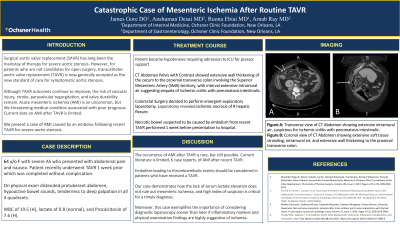Tuesday Poster Session
Category: Colon
P3121 - Catastrophic Case of Mesenteric Ischemia After Routine TAVR
Tuesday, October 24, 2023
10:30 AM - 4:00 PM PT
Location: Exhibit Hall

Has Audio

James Gore, DO
Ochsner Clinic Foundation
New Orleans, LA
Presenting Author(s)
James Gore, DO, Anshuman Desai, MD, Ruona Ebiai, MD, Arnab Ray, MD
Ochsner Clinic Foundation, New Orleans, LA
Introduction: Surgical aortic valve replacement (SAVR) has long been the mainstay of therapy for severe aortic stenosis. However, for patients who are not candidates for open surgery, transcatheter aortic valve replacement (TAVR) is now generally accepted as the new standard of care for symptomatic aortic stenosis. Although TAVR outcomes continue to improve, the risk of vascular injury, stroke, paravalvular regurgitation, and valve durability remain. Acute mesenteric ischemia (AMI) is an uncommon, but life-threatening medical condition associated with poor prognosis. Current data on AMI after TAVR is limited. We present a case of AMI caused by an embolus following recent TAVR for severe aortic stenosis.
Case Description/Methods: 64 y/o F with severe AS who presented with abdominal pain and nausea. Patient recently underwent TAVR 1 week prior which was completed without complication. On physical exam distended protuberant abdomen, hypoactive bowel sounds, tenderness to deep palpation in all 4 quadrants. WBC of 19.5 (H), lactate of 0.8 (normal), and Procalcitonin of 7.6 (H). Patient became hypotensive requiring admission to ICU for pressor support. CT Abdomen Pelvis with Contrast showed extensive wall thickening of the cecum to the proximal transverse colon involving the Superior Mesenteric Artery (SMA) territory, with interval extensive intramural air suggesting sequela of ischemic colitis with pneumatosis intestinalis. Colorectal Surgery decided to perform emergent exploratory laparotomy. Laparotomy revealed ischemic necrosis of R hepatic flexure. Necrotic bowel suspected to be caused by embolism from recent TAVR performed 1 week before presentation to hospital.
Discussion: The occurrence of AMI after TAVR is rare, but still possible. Current literature is limited, 6 case reports, of AMI after recent TAVR. Embolism leading to thromboembolic events should be considered in patients who have received a TAVR. Our case demonstrates how the lack of serum lactate elevation does not rule out mesenteric ischemia, and high index of suspicion is critical for a timely diagnosis. Moreover, this case exemplifies the importance of considering diagnostic laparoscopy sooner than later if inflammatory markers and physical examination findings are highly suggestive of ischemia.

Disclosures:
James Gore, DO, Anshuman Desai, MD, Ruona Ebiai, MD, Arnab Ray, MD. P3121 - Catastrophic Case of Mesenteric Ischemia After Routine TAVR, ACG 2023 Annual Scientific Meeting Abstracts. Vancouver, BC, Canada: American College of Gastroenterology.
Ochsner Clinic Foundation, New Orleans, LA
Introduction: Surgical aortic valve replacement (SAVR) has long been the mainstay of therapy for severe aortic stenosis. However, for patients who are not candidates for open surgery, transcatheter aortic valve replacement (TAVR) is now generally accepted as the new standard of care for symptomatic aortic stenosis. Although TAVR outcomes continue to improve, the risk of vascular injury, stroke, paravalvular regurgitation, and valve durability remain. Acute mesenteric ischemia (AMI) is an uncommon, but life-threatening medical condition associated with poor prognosis. Current data on AMI after TAVR is limited. We present a case of AMI caused by an embolus following recent TAVR for severe aortic stenosis.
Case Description/Methods: 64 y/o F with severe AS who presented with abdominal pain and nausea. Patient recently underwent TAVR 1 week prior which was completed without complication. On physical exam distended protuberant abdomen, hypoactive bowel sounds, tenderness to deep palpation in all 4 quadrants. WBC of 19.5 (H), lactate of 0.8 (normal), and Procalcitonin of 7.6 (H). Patient became hypotensive requiring admission to ICU for pressor support. CT Abdomen Pelvis with Contrast showed extensive wall thickening of the cecum to the proximal transverse colon involving the Superior Mesenteric Artery (SMA) territory, with interval extensive intramural air suggesting sequela of ischemic colitis with pneumatosis intestinalis. Colorectal Surgery decided to perform emergent exploratory laparotomy. Laparotomy revealed ischemic necrosis of R hepatic flexure. Necrotic bowel suspected to be caused by embolism from recent TAVR performed 1 week before presentation to hospital.
Discussion: The occurrence of AMI after TAVR is rare, but still possible. Current literature is limited, 6 case reports, of AMI after recent TAVR. Embolism leading to thromboembolic events should be considered in patients who have received a TAVR. Our case demonstrates how the lack of serum lactate elevation does not rule out mesenteric ischemia, and high index of suspicion is critical for a timely diagnosis. Moreover, this case exemplifies the importance of considering diagnostic laparoscopy sooner than later if inflammatory markers and physical examination findings are highly suggestive of ischemia.

Figure: interval extensive intramural air suggesting ischemic colitis with pneumatosis intestinalis
Disclosures:
James Gore indicated no relevant financial relationships.
Anshuman Desai indicated no relevant financial relationships.
Ruona Ebiai indicated no relevant financial relationships.
Arnab Ray indicated no relevant financial relationships.
James Gore, DO, Anshuman Desai, MD, Ruona Ebiai, MD, Arnab Ray, MD. P3121 - Catastrophic Case of Mesenteric Ischemia After Routine TAVR, ACG 2023 Annual Scientific Meeting Abstracts. Vancouver, BC, Canada: American College of Gastroenterology.
